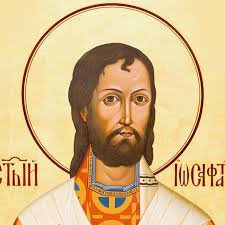HOMILY WEEK 32 02 – Year II
Gracefully Responding to Grace:
Memorial of St. Josaphat
(Titus 2:1-8, 11-14; Ps 37; Lk 17:7-10)
***************************************
“For the grace of God has appeared, bringing salvation to all.”
This proclamation by St. Paul to Titus provides the context for today’s readings that are all about God’s salvation freely given to us through Jesus, and the invitation for us to fully respond to with grace-full lives of faith, hope and love.
St. Paul, as always, is very clear. The grace of God that has appeared and been revealed is Jesus Christ, who is “our great God and Savior,” bringing salvation to all. Without using the word as such, he goes on to describe Jesus as the Messiah who had a two-fold mission to redeem and sanctify, or as St. Paul puts it here, “that he might redeem us from all iniquity and purify for himself a people of his own.” Having reminded us of this great good news, Paul then succinctly summarizes what our response should be – a people zealous for good deeds.
Our first zealous response, then, is to approach Jesus with humble self-awareness to avail ourselves of that gift of salvation, which is first and foremost, forgiveness of all our sins, and healing of all our sinfulness, our painful emotions and negative attitudes.
The rest of the reading describes what our zealous lives should include: renouncing impiety and worldly passions, being self-controlled, upright and godly as we wait in joyful hope for the second coming of Jesus.
Then Paul breaks it down into a litany for the different stages of life: older men are to be prudent and temperate, sound in faith and love; older women should model reverend behavior to younger women, teaching them to be the best wives and mothers they can be, loving, kind and respectful. Younger men are advised to check their passions, be diligent and careful in their actions.
In the gospel, Jesus adds the element of humble obedience to the Word of God. According to Bishop Robert Barron, our lives are not about us; they are about the King. We are built not for commanding others but for obedience. In the presence of the awesome lordliness of God—that mind and will whose grandeur we can barely fathom—we bow, we listen, we surrender.
The Lord is the King, the one who commands, directs, oversees, and who, accordingly, demands obedience. For a military tribe such as the ancient Hebrews, this term (obedience) had, to be sure, an especially powerful resonance. The proper response to a King is obedience. The King commands, and the servant responds—simply, promptly, unhesitatingly.
The word “obey” is derived from the Latin obedire, to listen attentively, to heed. In the presence of God, the Lord, we his servants should listen, bending our ears and our wills to his word. A courtier or a messenger might not understand the rationale for, or consequences of, what the King has told him to do, but he does it, trusting in the wisdom and power of the one who sends him.
In his book Walk in the Light, Leo Tolstoy relates how Julius, a young Roman citizen, constantly allured by the false promises of a dissolute Roman society, is attracted yet also puzzled by the witness of Pamphilius, his young Christian friend. The life of Pamphilius is obviously in stark contrast to his, as Pamphilius exudes the joy and serenity Julius is yearning for and unable to find. Tolstoy, it seems, was profoundly influenced by The Teachings of the Twelve Apostles (The Didache), a very early Christian manuscript discovered at Constantinople in 1875, a manuscript that resonates with what St. Paul wrote to Titus.

St. Josaphat
Today the Church honours St. Josaphat, born John Kuncewicz in present-day Ukraine about 1580. Upon entering the Order of St. Basil, he chose the name ‘Josaphat.’ He was ordained a priest of the Byzantine rite in 1609 and soon gained renown for his preaching. In 1617, named archbishop of Polotsk, Russia, he worked for the renewal of the diocese and for the union of the Ukrainian Church with Rome. Many opposed Josaphat, claiming he was trying to impose Roman-style Catholicism on the Ukrainian Church. He was slain by opponents in 1623 in Vitebsk. In 1867 Josaphat became the first Eastern saint to be formally canonized.
The Eucharist is our one great act of fidelity, celebrated by St. Paul and the first Christians down to this day. We are instructed by the Word of God, experience salvation through forgiveness and healing, and nourished by the very body and blood of Jesus himself.
May our celebration empower us to be a zealous people of God, responding to the grace of salvation by our lives of faith, hope and love.



